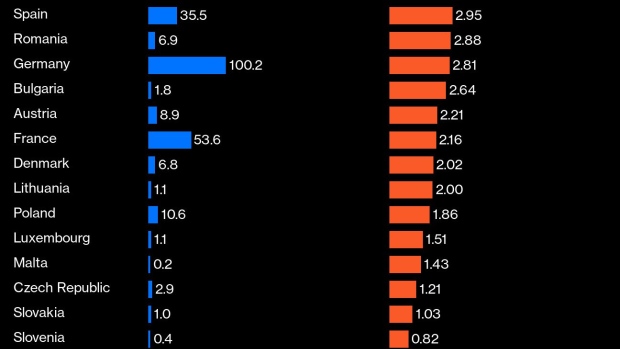Sep 21, 2022
Europe’s Deepening Energy Crisis Pushes Bill to $500 Billion
, Bloomberg News

(Bloomberg) -- The bill for Europe’s energy crisis is nearing 500 billion euros ($496 billion) as governments rush to soften the blow of soaring prices, according to the Bruegel think-tank.
The European Union’s 27 member states have so far earmarked 314 billion euros to cushion the impact of the energy crunch on consumers and businesses, while the U.K. has allocated 178 billion euros, Bruegel’s updated estimates showed on Wednesday.
The growing fiscal burden -- EU spending accounts for 1.7% of the bloc’s gross domestic product -- comes as European nations grapple with accelerating inflation and a bleak economic outlook. EU ministers are negotiating an emergency plan that will transfer windfall energy company profits to vulnerable households and firms. The deal, expected to be reached on Sept. 30, also includes a power price cap and a target to reduce electricity demand as Moscow squeezes gas flows to the region.
“Initially designed as a temporary response to what was supposed to be a temporary problem, these measures have ballooned and become structural,” said Simone Tagliapietra, researcher at Brussels-based Bruegel. “This number is set to increase as energy prices remain elevated. This is clearly not sustainable from a public finance perspective.”
While Bruegel’s estimates include measures such as lower value added tax rates on electricity, subsidies for heating and measures to keep some energy companies afloat, they do not fully reflect the scale of liquidity support across Europe. In Germany, the government will nationalize Uniper SE, a plan that involves injecting 8 billion euros ($8 billion) into the company and buying the majority stake held by Finnish utility Fortum Oyj.
The rising costs of the energy crisis threaten to deepen economic divergencies among EU member states, according to Tagliapietra.
“This level of intervention also entails a risk of fragmentation across Europe: governments with more fiscal space will inevitably better manage the energy crisis by outcompeting their neighbors for limited energy resources over winter months,” he said. “It is thus important to design policies that can ensure fiscal sustainability and coordinate them -- notably among EU countries.”
©2022 Bloomberg L.P.






